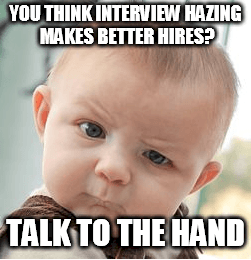In the May 16, 2017 Ask The Headhunter Newsletter, a reader asks how college students can turn a degree into a job upon graduation.
Question
When I graduated high school at age 19 I tried to find a job in the town where I live. Well, I couldn’t get anybody to hire me so I made a resume. A couple of employers have my resume and are keeping it on file. So now I’m 20. I just started college. I enrolled so I could have a better chance at getting a job. Can you please give me some advice about how to make sure I have a job when I graduate?
 Nick’s Reply
Nick’s Reply
Every job seeker I’ve ever known would love to have four years to find a job. College students do, so start now! I’ll try to show you how.
A college degree is the wise choice
Good for you for going to college. There seems to be a movement nowadays to skip college and either get a job immediately out of high school, or go to a trade school. Unfortunately, this is being cast as an either-or choice. It’s not. College is not just about getting a job. It’s about getting educated. But that doesn’t mean colleges can afford to ignore students’ need to get a job when they graduate.
While a college’s first mission is to deliver a good, well-rounded education, there’s no reason a college cannot also help its graduates get jobs. Sadly, few colleges provide effective career services. At best, they offer pedestrian tools and poor job-hunting advice delivered by inexperienced staffers, and a place where employers can post jobs for students. Telling students to “Make sure you visit Career Services!” is not enough — and colleges can do much, much more. Students and parents who pay for college should demand more.
Let’s look at what you can do from the first day of college to help ensure you’ll get a good job when you graduate. More important, let’s consider how every college and university can help every student do these things — and why every college and university must.
College Students: Start thinking about jobs now
College is a good move for you. But many people who finish college complain they still can’t get a good job. I think the reasons are clear. During college, they don’t do internships or get part-time jobs in good businesses. They don’t meet people who might hire them later.
I’m not saying to work so much during college that your studies suffer – don’t do that. For example, if you can study 100% of the time during your first year, that’s good. Get comfortable with your studies and learn to manage your education. But start thinking about jobs, too, and plan on experimenting with different kinds of work.
Experiment: Pick some companies
By the middle of year two, you should be thinking about what kinds of companies you might like to work for when you graduate. It’s more important to pick a few reasonable ones than to pick the ones you’ll ultimately start a career in. That is, you can change your mind later, and you’ll probably change it more than once. The point is to choose some kind of work you’d like to try part-time, and see where it leads you. (See Pursue Companies, Not Jobs.)
What’s important is not to pick the right job or company. It’s to learn how to experiment with work and to learn from each experiment.
An experiment might be a job at a deli or an internship with a company’s marketing department. But it must be something where you get your hands dirty doing real work, even if it’s just a little work for a little while. And, more important than having a job is meeting people in the world of work.
It’s all about people
Most jobs are found and filled through personal contacts, not through job postings, career centers, or employment agencies. College students’ first job is to meet people — preferably people who work in companies and on products and services you think you’re interested in. Those people will educate you about work and about jobs and employers. The sooner you start developing these contacts and learning from them, the better. (Do you think you have no contacts? See I don’t know anybody.)
Find people who work in the companies you think you’re interested in.
- Ask your friends and fellow students if their parents or older friends work in those companies.
- Ask to be introduced to those people – then ask those employees what it’s like to work there.
- Or, ask your friends where their parents and friends work — and start selecting companies to explore that way.
Don’t be nervous. These are people who’ve been introduced to you. Talk to them.
How to say it
“I’m a long way from graduating, but I’m starting to learn about companies I might be interested in working for. You mentioned your brother works for ABC Corp. Do you think he’d be willing to talk with me about the company and his job — what it’s like to work there? Please keep in mind, I’m not looking for a job! I just want to learn about the company.”
Not everyone will be willing to talk with you, but my guess is most people will simply because they love to talk about their work — and they love to give advice to college students.
If you get these conversations, talk shop.
How to say it
“What’s it like to work in sales? (Or marketing, or engineering, or product development?)”
“I’d love to hear about your work. What do you actually do every day?”
“Is there something you’ve pulled off — a cool thing you’ve accomplished — that made you glad you have this job?”
“What does your boss look for when filling entry-level jobs?”
“What courses and training would be best for such jobs?”
You will learn a lot and, if you pay attention, these conversations are what will show you how to prepare for those kinds of jobs.
Meet the juniors and seniors
There’s one special class of people who can really help you if you will invest the time: College students more senior than you. They will graduate first, and they’ll have jobs while you’re still going to school. They’re the perfect channel for learning about many employers.
- While you’re a freshman or sophomore, meet all the juniors and seniors you can at your college.
- If you’re at a two-year school, meet second-year students.
These people are gold! Once they’re employed:
- Hang out with them.
- Go visit them at work.
- Join them for lunch in their company cafeteria.
- Meet them after work at local joints where employees hang out.
- Become part of their group and make more friends among the employees.
Try to meet their bosses – not to ask for a job, but to ask about the business and about the work. This shows you’re motivated, but they don’t have to hire you now, so there’s no pressure on them.
You’re just making friends – with people you’ll work with later! All these people will remember you. While they’re tossing incoming resumes of people they don’t know in the trash, they will remember you. That’s where jobs come from. It’s very likely this is how they found their own jobs — via personal referral. (See Referrals: How to gift someone a job (and why).)
Cultivate friendships now
Once you meet all these people, don’t lose the new contacts you make! If you stay in touch, you’ll become a known entity to the insiders you become friendly with. Personal relationships can take years to develop before they might lead someone to introduce you to their boss about a job.
The point is, if you start doing this early, there’s no hurry. You have loads of time while you earn your degree. And by graduation, you should have loads of good, personal contacts — people who have gotten to know you well enough that they’re comfortable recommending you for a job to their company.
If you’re nervous about “networking,” don’t network. Never say or do anything that feels awkward. But I think you’ll never feel awkward if you approach a new contact by asking them about their work. People love to talk about themselves, so help them — and you’ll make new friends. (See “Make personal contacts to get a job? Awkward…” Get over it!)
Connect school to work
Whether you’re taking an Early American Literature course for fun, but want to be an engineer, or you’re studying accounting and you’d really like to be a social worker, there’s something in every academic course that can be applied to the work you’d like to do.
Writing a good Lit paper requires logical thinking and being able to show how premises A, B and C clearly lead to the conclusion you’re trying to make. You might laugh, but that’s how digital circuits work, too. Try to map the argument for your Lit paper using a circuit diagram. Show it to your engineering professor and to an engineer you meet through your friends.
Social work is usually funded through public sources of money. If you’re studying accounting, try to map out a business model for a social services agency. Go meet the manager of such an agency and ask how its success is calculated. Better yet, ask your accounting professor to invite the head of a social services agency to give a talk to your class.
These are just two examples of how to stimulate useful discussions. That’s how you make friends who have the kinds of jobs you want!
 Colleges have an obligation to deliver ROI
Colleges have an obligation to deliver ROI
Colleges don’t like to make these connections. They claim it detracts from time spent on a course’s subject matter. Bunk. Colleges are good at teaching what, but Colleges fail How. They don’t make the connection between education and how to do work.
I tell college administrators that every course should include one class session that features someone from the work world talking about these connections — no matter how far-flung or weird they are!
If all college students had one class period in every course over four years where someone from the real world of work came to discuss how an academic topic could be related to a job, those students would meet dozens of people who could help mentor them into jobs upon graduation. (They’d have some fun discussions, too!)
That’s where job opportunities come from!
Colleges love to cite job placement rates and salaries of new grads (when the statistics suit their marketing campaigns), but they don’t like to talk about their second big obligation. School is not just about getting educated. Colleges also have an enormous obligation to show return on investment (ROI) to those students who want to get a good job after graduation. Imagine any college or university administrator explaining to the parents who fund an education that, “This isn’t about college students getting a good job.”
Start small
These methods for meeting people and talking shop — you can start using them freshman year — should lead you to opportunities for part-time or summer jobs or internships. But, what kinds of jobs should you pursue?
It almost doesn’t matter. Start small and don’t be afraid of making mistakes. If a company you meet this way will let you work part-time, take the job, even if it’s not exactly the kind of job you’d want after graduation. The point is, once you’re in there, you can meet people in the departments where you really want to work. Once again — it’s all about the people you meet. The more, the better! You have four years to parlay these relationships into a job.
Ask them about their work – make friends with them. Let them see you’re a dedicated worker and really interested in what they do. (Just be careful. Don’t be a pest and don’t stalk them!)
The point is simple: Take any job you can get, to meet people in the companies where you’d like to work later. They’re the ones who will recommend you for jobs you really want when you graduate.
Invest
You can already see this takes time. It can take quite a bit of time. It can take even seasoned professionals two or more years of getting to know people before they consider you seriously for a job. I know how that sounds, but it’s true. It’s why it’s so hard for college students to find a good job from job postings — there’s no one you can get to know by filling out forms online. If it hasn’t dawned on you already, the “people approach” is a lot more fun than responding to ads!
People who just submit resumes and fill out online applications get passed over because the hiring managers don’t know them. Managers hire who they know. (See Why am I not getting hired?)
While you’re in school, take advantage of this fact and circulate widely among people who do the kind of work you want to do. Invest. Rack up all the time you can being around people you’d like to work with. Try to meet their bosses – they will remember you later.
Why this works
Smart managers tend to hire people they know, or people known to their employees. While this might bother you because it seems unfair, consider that it’s prudent because it lowers the risk of getting a lousy worker. Would you loan money to a friend, or a total stranger? Would you trust your business to someone a friend vouched for, or someone you don’t know anything about? This is just basic human nature – but it’s not unfair. It’s a good survival mechanism.
So, your challenge while you’re in college is to get to know people who know people at the places where you want a job in a few years. Start now. You’ll get hired because someone that knows you vouched for you.
(To learn more about what to do when you get in front of a hiring manager, see Ask The Headhunter In A Nutshell: The short course.)
Be honest and give back
Never do what I’m suggesting just to get what you want. Make real friends. Only hang out with people you’re really interested in – and be a good, honest friend yourself.
Don’t just expect something from others – do things to help them, too. Give back. This is not about manipulating anyone to get what you want. It’s about making real friends in places where you’d like to work. It’s about building a good reputation long before you get hired. It’s about creating trust.
Once you’ve made friends in the work world, it’s natural to ask them for advice when it’s near time to get a job. One (or more) of them will introduce you to your next boss. Not all of them, of course. But you need just one.
The four-year job search
I think college will be a wonderful experience for you. And if you find your college doesn’t do much to prepare you to get a job, go talk to your college president. Ask why your career is not high on your school’s priority list. Then suggest that every course should include one class session that features someone from the world of work exploring connections between the course topic and a job. Ask why your college does not regularly, and as part of the curriculum, introduce you to alumni who can show you how your education applies to work.
To ensure you’ll get a good job when you graduate, start your job search your freshman year. I wish you the best! Study hard — and meet lots of people who do the kinds of work you think you’d like to do!
Should college prepare you to get a job? If you went to college, what help did your school provide to start your career? What do you think colleges should do — above and beyond delivering education — to ensure graduates get jobs?
: :
I have a year to go until I graduate from college. I’m not the best student, but I do pretty well. I’m here to learn, but there is a lot more to college and I take advantage of it. But now I’m a little worried. My grades could be better. I could spend a little less time at the pub, and more on academics. However, homework seems like a redundancy to me. I learn in lectures, in section classes and in assigned readings. Don’t misunderstand, I crank out the papers and I get ready for tests. But doing homework? It has nothing to do with preparing you for the real world. Even people who work long hours leave the office behind at the end of the day.



 My son, who earned an advanced STEM degree, was hired by a firm which was highly impressed by his education, and emphasized how important it was to have someone with his qualifications joining their team.
My son, who earned an advanced STEM degree, was hired by a firm which was highly impressed by his education, and emphasized how important it was to have someone with his qualifications joining their team. Nick’s Reply
Nick’s Reply Colleges have an obligation to deliver ROI
Colleges have an obligation to deliver ROI The big problem is I started to be sexually harassed by a woman co-worker. (I am gay.) This became very uncomfortable. When I finally reached my temp agency, they told me to talk to the woman and tell her (nicely) to take it easy. When I spoke with her, she seemed okay, but then she sent me a very disturbing passive-aggressive e-mail. I forwarded that to my agency and to my on-site manager.
The big problem is I started to be sexually harassed by a woman co-worker. (I am gay.) This became very uncomfortable. When I finally reached my temp agency, they told me to talk to the woman and tell her (nicely) to take it easy. When I spoke with her, she seemed okay, but then she sent me a very disturbing passive-aggressive e-mail. I forwarded that to my agency and to my on-site manager.

